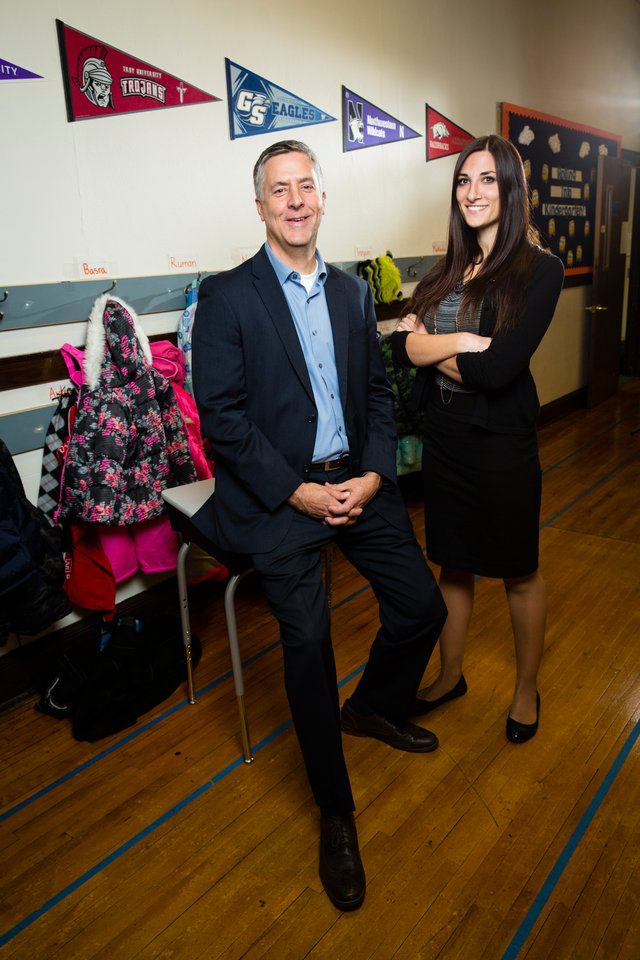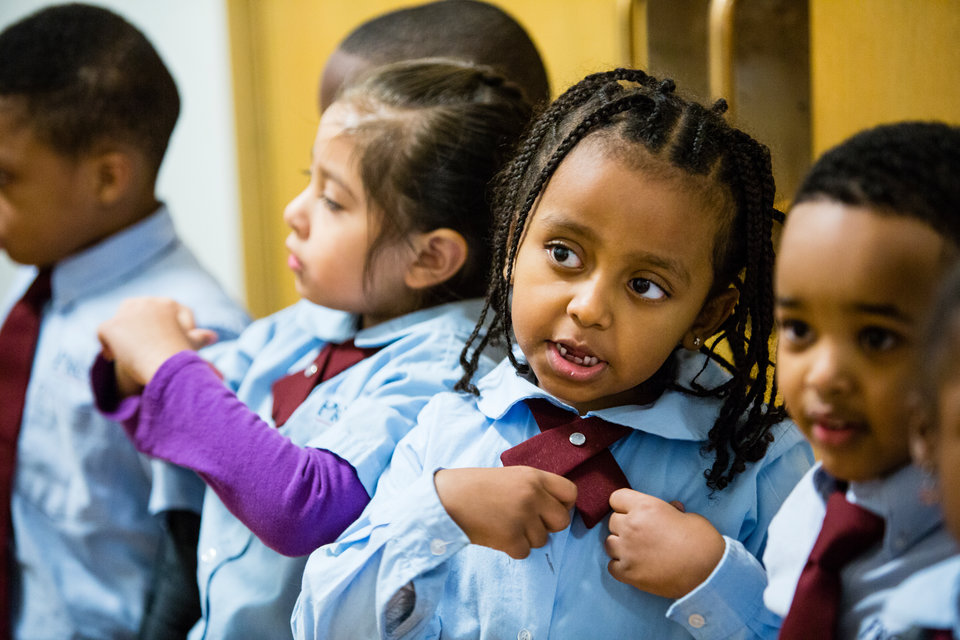Words reverberate down the hallway.
“I am somebody!” two speakers shout, and 200 people standing single file on both sides of the corridor repeat the words and those that follow, line by line:
"I was somebody when I came in.
I’ll be a better somebody when I leave.
I am powerful. I am strong.
I love the education that I get here.
I have things to do.
People to impress.
And places to go.
I am somebody!"
These are not protesters or revivalists or motivational speakers. They are kindergartners, first-graders and second-graders, and at 7:30 a.m. every Monday through Thursday they line a hallway at their school and participate in The Chant.
The Chant is a pride-filled occurrence in the lives of students at Prodeo Academy, a K-3 public charter school in Columbia Heights. Looking around, reminders of the University of St. Thomas are everywhere. Alumni, students and parents are founders, teachers, board members, tutors, volunteers and donors at Prodeo. A St. Thomas banner hangs outside a classroom in which third-graders do a separate St. Thomas chant. It concludes:
"We’re St. Thomas, going on to college
Showin’ all the values, got compassion like whoa
It’s a year for learning, let us show you our programs
All you gotta know is we’re St. Thomas."
“The support we have received from St. Thomas is outstanding,” said executive director Rick Campion, a 1990 alumnus and co-founder of Prodeo with principal Chancey Anderson ’11 M.A. “We wouldn’t be nearly as successful without the involvement of so many people at St. Thomas.”
The involvement and support are critical to the school’s well-being. In working with children, many from challenging socioeconomic backgrounds, Prodeo has established a culture and a learning environment to address five gaps that the African American Leadership Forum says lead to underachievement: preparation, belief, time, teaching and leadership.
“We wanted to look at best practices around the country in creating Prodeo,” Anderson said. “Rick and I decided to visit high-performing schools – 37 of them – that were doing well. What did those schools have in common? We had seen Minnesota schools start and fail, and we didn’t want that.”
Unlikely duo
Campion and Anderson seem, at first glance, unlikely partners to start a school like Prodeo.
He graduated from St. Thomas with a major in Spanish and received his teaching license, “but I really had no idea what I was going to do.” He bounced around, teaching in the Bronx, Minneapolis and Duluth and working in sales for Ecolab in Mexico before landing at his high school alma mater, Totino-Grace, in 1996. He stayed for 12 years as a teacher, hockey coach and fund-raiser, and earned his education specialist degree and principal’s license from St. Thomas in 2002.

Prodeo Academy Executive Director Rick Campion and Principal Chancey Anderson.
She grew up in Seattle and graduated from St. Olaf in 2004 with a degree in English and family studies. She taught for three years at a Catholic girls boarding school in Oxford, England, before returning to the United States to teach Korean students at a private school in St. Paul.
They crossed paths in 2008 when they joined the faculty of the new Cristo Rey Jesuit High School in south Minneapolis. Campion loved the emphases on a college preparatory curriculum and on reducing the achievement gap, and Anderson believed it would be “a great fit because I knew that was the demographic I wanted to work with.”
But as much as they thrived at Cristo Rey, they longed for something different. They saw students arrive there lagging in performance, and they decided the best way to address the achievement gap was to start with children when they were much younger.
They left Cristo Rey in 2011, Anderson to finish a master’s degree in early literacy at Columbia University in New York and Campion to prepare for opening Prodeo. They stayed in constant touch. Anderson developed the curriculum and Campion applied for state approval, developed a budget, raised funds, found a building and recruited a board. They hired teachers and conducted perhaps the most critical job: “a listening campaign” with doubtful families.
“It was exceptionally hard to get to 66 kids,” the first-year target for kindergarten, Campion said. “Two white people starting a charter school on the north side of Minneapolis? Please! ‘Why you?’ we would be asked. ‘Why here? Why now?’ We had to sell and resell and resell.”
“We didn’t know if kids would come,” Anderson said. Ninety registered, “but we weren’t sure they’d get on the bus. The first week, we rode buses and in some cases we woke up families and said, ‘We’re not leaving until your kids are on the bus.’”
The kids showed up that first day in 2013, greeted by six staff members and three teachers, and they keep coming back as Prodeo adds a class level each year. Enrollment is 285, including 10 children in a new pre-K program, the retention rate is 83 percent, and the faculty and staff have grown to 45 in a building adjacent to First Lutheran Church. Prodeo will move a few blocks later this year to a larger building in order to handle the 700 pre-K to eighth-grade students expected in 2021.
The opening days were “awesome,” Campion said. “What we had thought about for three years was happening. The kids were here – in uniforms. They were really here! They were in class! It was cool to see kids in a good school that would change the direction of their lives.”
Student progress is monitored through standardized math and reading tests three times a year and individual tests every six to eight weeks. Ninety percent couldn’t pass a pre-K assessment test the first year, Anderson said, “but almost all of them did by the end of the year. Our averages are above the national averages. On the whole, we have been able to close the gap with most kids.”
Life in the classroom
The hallmarks of a Prodeo education are small classes and intense personal instruction provided by teachers such as St. Thomas alumni Alex McCoy ’10 and Emily Hoeppner ’16.
McCoy was a star center on the Tommies’ 30-1 men’s basketball team in 2009 and is coach of this season’s junior varsity. He towers over the 21 first-graders in his classroom, which is named after Georgetown University to encourage students to think about college. He comes from a family of teachers, including his mother, a professor at Macalester, and he taught at Riverview Elementary School in St. Paul before moving to Prodeo last fall.

Al McCoy '10 reads to his first-grade class.
“The culture here appealed to me,” he said. “People were really out to help kids learn across the board. Rick and Chancey painted a picture of how I wouldn’t be the same person when I leave Prodeo as when I came in – that I would grow as an educator. This is not just a learning experience for the kids, but for the teachers too.”
In his 8:15 a.m. Reading Aloud class, students finish their breakfast of apples, cereal and milk as McCoy reads from Fireflies, which is about a boy who catches fireflies and puts them in a jar. McCoy frequently stops to ask questions. Why would the boy poke holes in the jar? “So they can breathe,” a student said. Why was the boy not wearing shoes? “He rushed outside.” Would the jar be darker if it was filled with 100 fireflies? “No, lighter. They are fireflies!”
During the reading, seven children leave to work with tutors. McCoy stops and splits up the remainder. Some students stay for discussion with an educational assistant and four children huddle with McCoy to work on vowels.
“This place is wonderful,” McCoy said. “It rejuvenated my love for teaching and helped me remember why I got into teaching in the first place. I watch these kids own their learning and I feel super successful when things work out well.”
At the other end of the building, Hoeppner reads with 24 third-graders in the St. Thomas classroom, which has a “UST Class of 2030” banner. The elementary education and psychology graduate is a Prodeo veteran: She got her field experience as a sophomore and returned to Prodeo the next two years as an intern, a summer employee and a student teacher. When a teaching vacancy came up for this school year, she was a natural choice.
“I always wanted to teach,” she said, recalling how as a little girl she would set up an extra bedroom as a classroom so she could practice. “I got to the point in college where I thought, ‘This is something I’d like to do.’"
Hoeppner finds herself as more than just a teacher, considering the social skills that some students lack and the behavioral issues that can arise. As she recites A Spy in the White House during her Reading Aloud class, a student slides low in his chair; she gives him a knowing glance and he quickly straightens.
“My job is so much more than content,” she said. “It’s exhausting, but there’s nowhere else I’d rather be. Change is happening here. There is a different vibe. We have the right mindset, and we know we can make a difference. We’re not spinning wheels. Everybody is on the same team and working toward the collective achievement of their kids.”

Emily Hoeppner '16 teaches her third-grade class.
Tutors are an important part of the education. Teachers prepare lesson plans for 100 tutors, who rotate in 60 two-hour shifts each week. Doug Jaeger, president of an engineering firm and a 2002 St. Thomas MBA alumnus, is on the Prodeo board, and he and his employees are tutors. Many other Tommies serve as tutors as well: Several business majors completing their community service requirement are tutors, as are basketball players and parents such as Sue Hannon, whose three sons have played basketball for the Tommies.
“I love it. The kids come in and they’re happy. They’re eager,” said Hannon, who tutors the same students every week “so I can form a relationship with them.” They work on math and reading, and she helps them define words like "compromise." “They tell you what it means – that I have to give up something to get something – like I’ll play basketball with you and then we’ll color together.”
Hannon hopes her involvement makes a difference and that the students “know I care about them and that they can achieve their dreams. These kids can go to college,” she said. “It’s not a matter of if they will go to college, it’s where.”
Prodeo students also visit St. Thomas. Anderson brings them to basketball games. Last fall, a journalism class taught by Dr. Carol Bruess prepared a communication plan for Prodeo, and as part of the project Prodeo students came to campus in groups of four to get a glimpse of college life.
Joe Mulvehill ’75 and his daughter Kelly are involved in Prodeo. They knew Campion and Anderson from Cristo Rey and liked the Prodeo concept. He is among hundreds of donors – “it’s about investing in people,” he said – and she comes into classrooms to teach mindfulness classes to help students deal with issues in their lives.
As satisfying as their journey has been, Campion and Anderson are not content to stand pat. They hope to open a second Prodeo in south Minneapolis in 2019 and a third Prodeo several years later in St. Paul. Their aspirations are guided by the meaning of prodeo, which is Latin for “moving forward.”
They are the first to admit they get tired. They get frustrated. They worry about budgets and test scores and if their students will sleep in warm beds with full stomachs. But when they arrive every morning, they find their spirits lifted by children who line a hallway to shout The Chant:
I am somebody!







